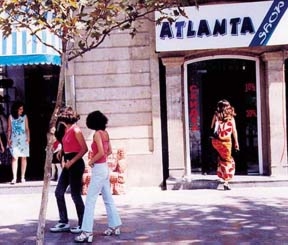|

Spring
2000 (8.1)
Page
35
Gular Hajiyeva
Dentist
  I was so pleased when
I heard we were changing our alphabet because it signified that,
at last, Azerbaijan would have its own script. It was high time
to get rid of everything that reminded us of the Soviet Empire.
Why should we keep that script if we were no longer part of their
empire? So I welcomed the change. I was so pleased when
I heard we were changing our alphabet because it signified that,
at last, Azerbaijan would have its own script. It was high time
to get rid of everything that reminded us of the Soviet Empire.
Why should we keep that script if we were no longer part of their
empire? So I welcomed the change.
I realized that it would create some problems, especially in
terms of publishing and converting documents, but I was happy.
The new alphabet was yet another sign of our independence.
When I first started learning the Latin script, I did run into
some difficulties with a few letters that were confusing to me.
But I soon got used to them and I don't have any problems now.
I suppose I haven't completely converted to Latin though. Whenever
I have to write something quickly in Azeri, like during a lecture,
I tend to use Cyrillic.
The best thing about the Latin script is that it is closer to
other languages. The letters are more attractive and easier to
look at. In Cyrillic - to tell you the truth - the letters are
crude and I don't like them very much.
Transition - Too
Slow
Unfortunately, the transition to the new alphabet is slow. I'll
give you an example. My uncle has always been known for his large
collection of books in his house. He is a lover of literature.
He used to buy every interesting book he could lay his hands
on, justifying himself by saying that he was doing it for his
kids. He has works from every Azerbaijani poet and writer in
his library - all of them in Azeri Cyrillic or Russian.
  My uncle's son is now
eight years old. The boy takes after his father and also loves
literature. One day he asked his father who Samad Vurghun was.
Without thinking, my uncle replied, "Go find a book of his
poetry in our home library." The poor boy searched all the
shelves, then came back to his father complaining that he couldn't
find anything. It was then that my uncle understood the reality
of the situation. Very few books in his library were in Azeri
Latin. None were about the most beloved Azerbaijani poet of the
20th century - Samad Vurghun. So here you have a father who has
organized an immensely resourceful library, but even his own
son can't fully benefit from it. This is the sad reality of our
new alphabet. My uncle's son is now
eight years old. The boy takes after his father and also loves
literature. One day he asked his father who Samad Vurghun was.
Without thinking, my uncle replied, "Go find a book of his
poetry in our home library." The poor boy searched all the
shelves, then came back to his father complaining that he couldn't
find anything. It was then that my uncle understood the reality
of the situation. Very few books in his library were in Azeri
Latin. None were about the most beloved Azerbaijani poet of the
20th century - Samad Vurghun. So here you have a father who has
organized an immensely resourceful library, but even his own
son can't fully benefit from it. This is the sad reality of our
new alphabet.
Don't Make "Intellectual
Cripples"
If a country ever does decide to change its alphabet, I would
advise it to really hold onto whatever script it eventually chooses
so as not to make cripples of the future generations. I say "cripples"
because that's the reality. Generations cannot be separated from
one another just because one generation doesn't know the next
one's alphabet. There must be one alphabet for all generations.
Also, if they do change, it's important to organize courses for
older people so that they can get used to the new alphabet. That
way they can read books and understand the Latin script that's
printed everywhere and not feel excluded from contemporary life.
Change Towards
Azeri
It's good to see that the attitude toward the Azeri language
is changing. Whereas Russian used to be considered more prestigious,
now more and more people understand how important it is to know
one's native language. In our clinic, there are some dentists
who only used to speak Russian before we gained our independence.
Now they're learning Azeri and trying their best to speak only
Azeri at work.
We're also trying to use the Azeri Latin script more often in
our clinic. Whenever we have new clients, we fill out applications
for them in Azeri Latin; in the past, we did it in Azeri Cyrillic.
It also makes me happy to see that more and more non-Azeri speakers
are trying to learn Azeri now. I have a neighbor who is Russian.
I hadn't seen her for quite some time. The other day when I ran
into her on the street, I was amazed that she was speaking perfect
Azeri. It's really a thrill when you see other people learning
and trying to communicate with you in your mother tongue, not
always theirs.
Gular Hajiyeva (born 1971) works at
Dental Clinic No. 11 in Baku. Her mother tongue is Azeri; she
also speaks Russian and a little English. At home, she speaks
Azeri with her family. Gular followed the Azeri track in school.
From Azerbaijan
International
(8.1) Spring 2000.
© Azerbaijan International 2000. All rights reserved.
Back to On the Street: Alphabet
Viewpoints Index
Back to Index AI 8.1 (Spring
2000)
AI Home |
Magazine
Choice
| Topics
| Store
| Contact
us
|


